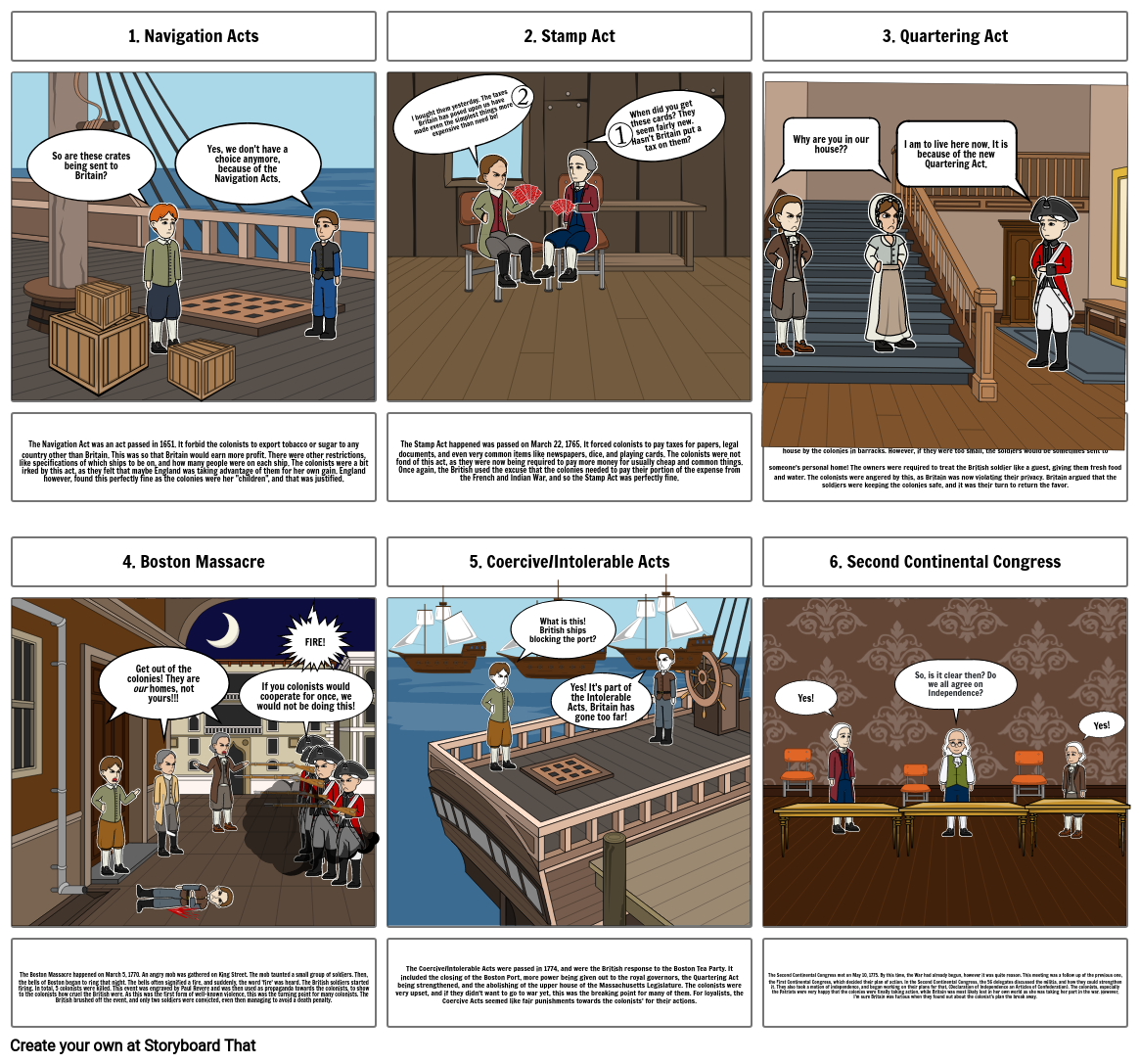Unknown Story

Texto del Guión Gráfico
- 1. Navigation Acts
- So are these crates being sent to Britain?
- Yes, we don't have a choice anymore, because of the Navigation Acts.
- 2. Stamp Act
- I bought them yesterday. The taxes Britain has posed upon us have made even the simplest things more expensive than need be!
- When did you get these cards? They seem fairly new. Hasn't Britain put a tax on them?
- 3. Quartering Act
- Why are you in our house??
- I am to live here now. It is because of the new Quartering Act.
- The Navigation Act was an act passed in 1651. It forbid the colonists to export tobacco or sugar to any country other than Britain. This was so that Britain would earn more profit. There were other restrictions, like specifications of which ships to be on, and how many people were on each ship. The colonists were a bit irked by this act, as they felt that maybe England was taking advantage of them for her own gain. England however, found this perfectly fine as the colonies were her "children", and that was justified.
- 4. Boston Massacre
- Get out of the colonies! They are our homes, not yours!!!
- If you colonists would cooperate for once, we would not be doing this!
- FIRE!
- The Stamp Act happened was passed on March 22, 1765. It forced colonists to pay taxes for papers, legal documents, and even very common items like newspapers, dice, and playing cards. The colonists were not fond of this act, as they were now being required to pay more money for usually cheap and common things. Once again, the British used the excuse that the colonies needed to pay their portion of the expense from the French and Indian War, and so the Stamp Act was perfectly fine.
- 5. Coercive/Intolerable Acts
- What is this! British ships blocking the port?
- Yes! It's part of the Intolerable Acts. Britain has gone too far!
- The Quartering Act of 1765 once again required something from the colonists. This time, British soldiers were to be house by the colonies in barracks. However, if they were too small, the soldiers would be sometimes sent to someone's personal home! The owners were required to treat the British soldier like a guest, giving them fresh food and water. The colonists were angered by this, as Britain was now violating their privacy. Britain argued that the soldiers were keeping the colonies safe, and it was their turn to return the favor.
- 6. Second Continental Congress
- Yes!
- So, is it clear then? Do we all agree on Independence?
- The Boston Massacre happened on March 5, 1770. An angry mob was gathered on King Street. The mob taunted a small group of soldiers. Then, the bells of Boston began to ring that night. The bells often signified a fire, and suddenly, the word 'fire' was heard. The British soldiers started firing. In total, 5 colonists were killed. This event was engraved by Paul Revere and was then used as propaganda towards the colonists, to show to the colonists how cruel the British were. As this was the first form of well-known violence, this was the turning point for many colonists. The British brushed off the event, and only two soldiers were convicted, even then managing to avoid a death penalty.
- The Coercive/Intolerable Acts were passed in 1774, and were the British response to the Boston Tea Party. It included the closing of the Boston Port, more power being given out to the royal governors, the Quartering Act being strengthened, and the abolishing of the upper house of the Massachusetts Legislature. The colonists were very upset, and if they didn't want to go to war yet, this was the breaking point for many of them. For loyalists, the Coercive Acts seemed like fair punishments towards the colonists' for their actions.
- The Second Continental Congress met on May 10, 1775. By this time, the War had already begun, however it was quite reason. This meeting was a follow up of the previous one, the First Continental Congress, which decided their plan of action. In the Second Continental Congress, the 56 delegates discussed the militia, and how they could strengthen it. They also took a motion of independence, and began working on their plans for that, (Declaration of Independence an Articles of Confederation). The colonists, especially the Patriots were very happy that the colonies were finally taking action, while Britain was most likely lost in her own world as she was taking her part in the war. However, I'm sure Britain was furious when they found out about the colonist's plan tho break away.
- Yes!
Más de 30 millones de guiones gráficos creados

